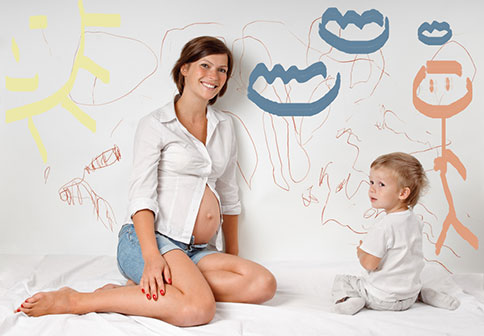The Connection between Pregnancy and Varicose Veins
Posted: Friday, October 3, 2014 | Revised: December 5, 2019
Carrying and giving birth to a baby is a wonderful experience for many women. Unfortunately, many of the things that come along with that experience are not so wonderful.

Pregnancy and Varicose Veins
Varicose veins are often one of those unfortunate side effects of motherhood. There is a strong correlation between pregnancy and the development of new varicose veins. These new bulging veins in your legs may cause you little discomfort, or they might make your legs feel tired and achy, with symptoms increasing toward the later part of the day.
Pregnancy itself is one of the major risk factors of developing varicose veins. According to WomansHealth.gov 50 to 55% of women experience varicose veins as a complication to a pregnancy.
Why Varicose Veins Occur During Pregnancy
Varicose veins occur during pregnancy for several reasons: hormones, increased blood volume, and elevated abdominal pressure. Levels of the hormone progestin rise dramatically early in the first trimester, causing the walls of the veins to relax and dialate (open). This decreases the speed of the blood flow from the legs to the pelvis. The mother’s blood volume doubles to supply the needs of the growing baby, which can make her veins bulge and her ankles swell. As the uterus grows, it puts pressure on the main vein that returns blood to the heart – the inferior vena cava, which further increases pressure in the mom’s leg veins.
Other contributing factors to varicose veins while pregnant include:
- Carrying twins or multiples
- Standing for long periods of time
- Older age
- The number of pregnancies
Varicose veins develop when the valves that keep the blood returning from the legs back to the heart don’t function properly. This allows the blood to pool in the legs, causing bulging veins, aching, swelling, itching, leg heaviness, fatigue and pain.
8 Steps to Reduce Your Risks
Here are some ways to reduce the risk of varicose veins during your pregnancy:
- Do your best to keep your weight within the range your doctor recommends
- Do low impact exercises daily to keep your circulation moving
- Elevate your feet and legs as often as possible
- Don’t cross your legs or ankles when you sit
- Move around, don’t sit or stand for long periods
- Don’t wear tight fitting or binding clothes, tight socks or knee-highs
- Wear maternity support hose or medical grade support stockings properly fitted by a professional
- Sleep on your left side to relive the weight of the uterus on the abdominal veins
Varicose veins that develop during pregnancy may improve within a few months after the baby is born. If yours don’t go away, it’s time to consult with a vein specialist to determine the appropriate treatment. If you have had problems with varicose veins during pregnancy and you plan on having more children, getting those veins treated before the next pregnancy can prevent a lot of pain and trouble. If at any time you notice that the veins feel hard, warm or painful or the skin over them looks red, call your doctor, as this can be a sign of a blood clot.
Call Michigan Vein Care Specialists today and schedule an appointment at 734-213-3700 or if you prefer to schedule your consultation request online please use our simple online Appointment Request Form.
Remember that whether your goal is to have the best looking legs you can, the best feeling legs you can, or both, we’ll help you meet those goals.